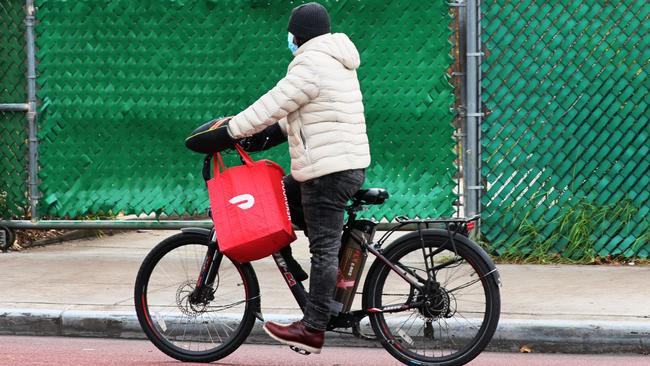Sky high: Why DoorDash is the ‘most ridiculous’ IPO of the year

The seven-year-old, loss-making food delivery firm floated last week at $US102 a share. By Friday, its stock had surged to $US175, valuing it at $US55bn ($73bn) nearly twice the size of Yum Brands, the fast-food giant behind KFC, Pizza Hut and Taco Bell. Its float came amid a frenzy of interest in tech: the next day, holiday booking platform Airbnb listed, and also saw its share price double.
The valuation of DoorDash in particular is so far removed from any recognisable financial metric, it beggars belief. Trainer said that to justify its value, the company would have to increase sales by 46 per cent a year for a decade, to turn its minus 8 per cent operating margin into a 20 per cent profit, and grow its market share to more than the size of the entire global food delivery market as it exists today. “It makes no sense,” he said. “This company is worth zero.”
The implications go far beyond DoorDash’s feverish float. British rival Deliveroo, which has also raised billions and operates at a loss, is eyeing a 2021 listing. Uber has pushed most of its casino chips into a bet on food delivery — chief executive Dara Khosrowshahi’s pledge to turn a profit finally in 2021 hinges on it. He snapped up DoorDash rival Postmates for $US2.6bn in the summer, while slashing a quarter of Uber’s staff and jettisoning self-driving cars and air taxis.
Referring to the explosion in demand for online food delivery, Khosrowshahi said: “I told the team we were in a business that just got two or three times bigger, and to do everything we could to turbocharge growth.”
The problem? It is not at all clear that food delivery, as an industry, will have staying power post-pandemic. DoorDash has reported one profitable quarter in its history, the three months to the end of June — the height of a once-in-a-century pandemic, which may soon recede as mass vaccine programs begin.
Trainer said of DoorDash: “Investors and bankers recognise that the window of opportunity to float this terrible business closes quickly when the threat of COVID-driven lockdowns no longer drives growth in food delivery demand.”
The company lost $US149m on $US1.9bn in sales through the first nine months of the year, better than the $US533m it lost on $US587m in turnover during the same period last year.

DoorDash’s founders, former Stanford University students Tony Xu, Andy Fang and Stanley Tang, crystallised multibillion-dollar fortunes last week. In its stockmarket filing, DoorDash, 25 per cent owned by WeWork backer SoftBank, claimed that just 6 per cent of the American population used the app and that it was at the start of a “broad market adoption” of food delivery as a regular part of life.
There is no evidence that in less extraordinary times the industry is anything other than a loss-maker. Deliveroo — started in London the same year as DoorDash — lost £243m ($425m) in 2018, though founder Will Shu said recently that its business had doubled in six months.
Uber reported a $US728m loss on $US2.2bn in the nine months to September. Grubhub, which rounds out the top three US companies, notched up an $US88m loss on $US1.3bn in sales over the same period.
Those figures do not factor in the worsening relationship with restaurants, many of which complain that steep delivery commissions wipe out their thin margins. Trainer said: “Food delivery is not a good business.”
Market insiders claim that part of the run-up is also due to bizarre market dynamics intensified by the pandemic. Record low interest rates are inflating asset prices as investors look for places to put cash. The retail investing boom, supercharged by services such as Robinhood, has also led to huge runs for other stocks such as Tesla and Airbnb. Trading in the latter swiftly doubled its value to nearly $US100bn. Like DoorDash, Airbnb has never turned a profit.




Analyst David Trainer called WeWork last year’s “most ridiculous” stockmarket offering. It was a prescient call, given the debacle that ensued at the shared offices provider. His candidate for 2020? DoorDash.